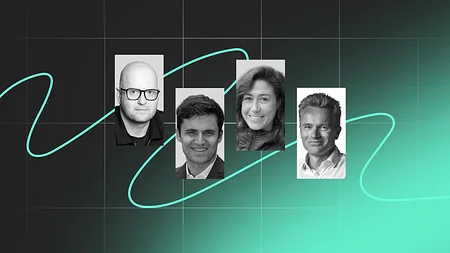Digital Wealth Management: It’s All about the Offense
Dave Bruno, Co-Founder at YNOME and Head of WM Innovation at UBS, explains how digital can scale wealth management for everyone.
Tell us a little bit about your background. You’re based in Switzerland, but you’re not from Switzerland…
“No – with this accent, definitely not! I’m originally from near Boston, two hours west…. I wanted to get to the big city so I moved to Boston, then here to the beautiful city of London, and then shortly thereafter failed at being a ski instructor in Switzerland. And [so] decided to get serious about my career and ended up in banking.”
So, wealth management. Whenever I hear that in fintech, I immediately think robo-advisors. Is that where we’re at?
“When I first started looking at this, I was in a strategic area trying to figure out, ‘how do we become thought leaders for the industry?’…. And when we looked around at that time, in 2011-12, robo had just started and it was pre-moniker. And I don’t think ‘robo’ is the right term for it – I think it’s ‘automated portfolio replication,’ and it’s kind of attacking that lower layer of where we’ve already automated services, so you take the hands off the wheel for clients….
“For me, I don’t have anything against robos; I’ve talked to maybe 100 or more of them. There’s more than 500 that are either on the market or on the way there…. So I have a lot of respect for it, but at the same time, it’s not the future of the industry.”
So what is the future of the industry?
“Well I think there’s a lot more to attack, and I’m a very offensive guy…. Privacy for services, for example, because this year is the year of AI. Everybody’s working on chat bots, voice bots. We’ve done it too, just to keep up with the pace…but that’s not really where we want to go.
“It’s more: privacy services, open finance, and beyond banking. Those are the three big green-fields we’re looking at intensively since about two years….”
So tell me more about privacy services. What’s the value proposition there?
“Well, I think private clients – wealthy people – have a lot to risk. Their kids go to private schools; people are protected. And when it comes to the digital world, these things are super-dangerous. I mean, everybody’s already got in trouble with these one time, right? You’ve got the Dropbox thing, you’ve got Instagram, and a couple of drunken photos and your reputation is ruined forever. So very wealthy people have security officers and they can look after their reputation online in the digital world, and that of their family and loved ones….
“And the ‘poor rich’ guys – so those middle class of people, just above a million up to 20, 50 million – they don’t have access to all that. So we’re trying to create this other layer of services that you could use to identify risks yourself, control your data, control your reputation, and look after your businesses better.”
You said there’s a massive, untapped opportunity for banks to attack other industries.
“That’s one of my favourite quotes ever, because it’s all about offense…. If we think we can just sit back in defense and just react to digital…and survive on doing financial transactions for super-wealthy people, we’re dead wrong. What happens is the pace of decline accelerates, and at some point you’re out of business, and therefore you’ve got to create a new P&L…. And so we’re trying to really actively create new Unique Service Selling Propositions in those other things that I was talking about.”
How do you define banks in a way that allows them to attack other areas?
“Well, if you look at the Bank of England: I love being in London…with those big, formidable walls, 15 metres tall that say ‘don’t come near us.’ And for those of you inside, you’re in the circle of trust here, right? You’re in a very safe zone. And that’s always been the sense of a bank: it’s private, it’s discreet; it looks after me, it protects me. And anything that goes towards that for clients…whether it be collectables, art… we have to be there and other vertical industries do that…The wealth art industry for example is a 60 billion transaction flow per year…and we’re nowhere near it.”
UBS is the bank for the ultra-wealthy, the billionaires. Is there any appetite for going lower in the market?
“It’s the affluent market who’s kind of been left in a hole between what’s happened over the last five to ten years after the crisis. So they’re not as well looked after as the super-rich. And basically, we’re trying to extend what’s happened for the super-rich, which is ultra-bespoke family office type service or multi-family offices…to other people who can use the same level of service but at a reasonable, scalable price point in business – which means you’ve got to do it digitally first….”
Is this really about digitisation and a move towards scalable services for everyone?
“I hope so. Because it’s a world I want my kids to live in…. I take a lot of satisfaction out of [the fact that] I can learn at a faster pace than I could as a kid when I had books…. And people still want to learn…. They’ll surf YouTube and they select what they want to look at and they’ll listen to that.
“So the concept of banks creating research and a view about everything and stochastically pushing that out on the market has ended…. I can see a world where analysts are paid for the amount of clicks they get, in a sense. How loved is my article? Did it go viral?”
You’re pretty well known for MakerZone, your YouTube channel…. What interests me is that that’s not a UBS, wealth-management persona.
“No, it’s not – and I try to never mix it with the brand, because I don’t want the bank to feel uncomfortable. And yet, at the same time, as an Innovation Chief, I’m always trying to push the boundaries. What we learned is that the only way to get proper exposure for sandbox pilots for things without paying millions in marketing money, which I don’t have access to actually, is to create an audience…. So it’s just us being good corporate citizens and not staying behind that closed Bank of England wall, but kind of opening up.”
Do you get feedback? Do people send questions?
“They do, and they kind of tell us what to innovate on…. My job is to make stuff. So I am trying to create the future by actively creating it, which means my guys will put their hands on it, roll up their sleeves, try to make a good product, roll it out…and say, ‘is this what you wanted?’…. I like that process because I learn a lot faster, and by learning faster, I’m ahead of other people.”
So what’s your best episode so far?
“I love the Amazon Alexa episode, because people loved it. Because they could see what we’re actually doing…
“I believe in innovating because I think corporations still have a huge potential to change the world…There’s a lot of guys who sit behind the desks in the banking industry right now who have the knowledge to change the industry and want to, and we have to enable them to do that, and that means they have to be in a comfortable environment where they feel like [they] can actually try something. So my mission is to, kind of, create that environment….”
Where do people find you?
“I’m David Bruno on YouTube and @SuperDaveBruno on Twitter. And ask me questions – honestly, it’s open innovation, so I’m trying to learn fast, which means I’m open for your questions.”
Dave’s interview first appeared on episode 125 of the FinTech Insider podcast. Subscribe to hear more great interviews.


